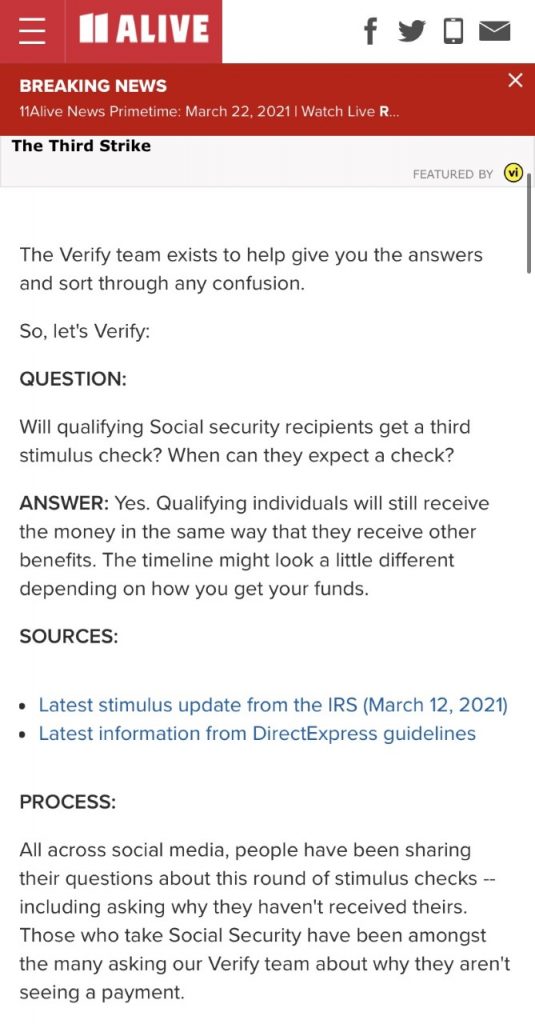Virtually any question can be answered in seconds. Mobile phones, computers and tablets have given access to so much information. However, not all information is good information. Inaccurate and misleading information is known as fake news or disinformation.
11Alive is a Georgia news station that is helping Georgia residents get accurate information. Based in Atlanta, Georgia, they are a part of the media company TEGNA Inc.
Why It’s Newsworthy: “Over half of the American population consistently endorse some kind of conspiratorial narrative,” according to a study by the American Journal of Political Science.
11Alive developed a fact-checking feature similar to what can be found on websites like factcheck.org and Snopes. This feature is called “Verify,” where viewers can request any piece of information to be debunked or verified.
“This [idea] came up in a brainstorming session with a bunch of people in TEGNA. There are so many rumors and so many things that are being spread that it really needs to be addressed,” said 11Alive Digital Investigative Producer Lindsey Basye.
However, newsrooms like 11Alive must establish a certain level of trust with the public when they verify or debunk information. According to a 2020 Gallup poll, only 40 percent of Americans have a “great deal/fair amount of trust in the media.” Because of significant distrust in the media, 11Alive explains the verification process and all sources cited in each post to their viewers.
“[Transparency] is a big part of our brand. We’re going to try to find the answer, but we might not be able to get it…but we’re going to try and we’re going to keep trying until we can figure it out,” said Basye.
When a request is made on Verify, it is determined by Lindsey Bayse to see if the question proposed can be accurately answered.
“I go through some of [the questions], and there’s a lot of venting. There’s no question. So that kind of stuff we don’t respond to. We try to respond to almost all of them, but some of them aren’t productive,” Basye said.
Once a response is deemed “practical,” a 13-member team of reporters, editors, producers and executive producers begin to investigate. The Verify team reaches out to a multitude of experts and sources to fact-check.
“We don’t speak from our point of view; we speak from experts’,” said Basye. “We’re really just a vessel for information to get to you.”

However, just because a piece of information is claimed to be “fact-checked,” does not mean that it will be accepted by the public. Lynn Walsh is an Emmy award-winning journalist and the associate director of Trusting News. She emphasized the idea that in some cases, fact-checking can potentially have the opposite effect of informing the public.
“If the fact check is coming from a source or news organization that someone already doesn’t trust or questions; then they probably are not going to trust that fact-check,” said Walsh. “And in some cases, it actually pushes that person further away from the truth.”
One of the primary problems with disinformation is the speed at which it spreads. “False news stories were 70% more likely to be re-tweeted than true stories” and “true stories took around six times longer to reach 1,500 people,” according to a study posted in the American Association for the Advancement of Science.
To combat this, Verify has implemented a strategy to get the most exposure when a verification article is posted. They use Google Analytics to understand how people are asking a particular question and the verbiage used. Then, they put it into search engine optimization (SEO) to gain traction on Google for their verification posts.
“I would say we get a few thousand [views],” said Basye. “A lot of these stories are picked up at different times.”
Verify can help Georgia residents gain access to reliable data. As the United States continues to live in a pandemic that has killed more than 500,000 people, it is crucial to have access to accurate information.
Although newsrooms like 11Alive are verifying information, Lynn Walsh expressed that fact-checking still may not cure the spread of disinformation.
“I don’t think [fact-checking] would eliminate [disinformation]. People have always been curious or have been skeptical of things, and you have these theories that pop up,” said Walsh. “I think some of that would still exist due to people sharing that or just believing it and then kind of getting sucked in with some of that, right, because of social media.”
Although 11Alive’s Verify may not be the cure for disinformation; it is the step in the right direction to help Georgians access accurate information.
Trey Young is a senior majoring in journalism at the Grady College of Journalism and Mass Communication at the University of Georgia.







Show Comments (2)
Jason T. Stephens
Fake news is today’s famous digital problem. This should be resolved appropriately.